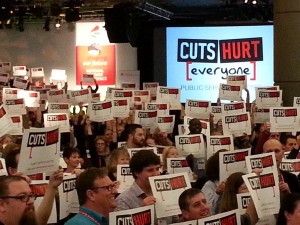The Essential Report Archive Read the latest report
-
government services, infrastructure, tax reform
Support for tax reforms
Q: Would you support or oppose the following tax reforms to raise more funds for Government services and infrastructure?
Total support
Total oppose
Strongly support
Support
Oppose
Strongly oppose
Don’t know
Support Jul 2015
Support Feb 2016
Stop companies and wealthy people using legal loopholes in minimise tax payments by sending funds offshore 86% 5% 65% 21% 3% 2% 8% na na Force multinational companies to pay a minimum tax rate on Australian earnings 80% 9% 55% 25% 6% 3% 11% 79% 78% Increase income tax rate for high earners 65% 23% 32% 33% 16% 7% 11% 63% 64% Remove superannuation tax concessions for high earners 62% 25% 29% 33% 14% 11% 13% 59% 58% Remove negative gearing 39% 35% 17% 22% 20% 15% 27% 37% 37% Remove GST exemptions (e.g. on food, education) 37% 54% 13% 24% 22% 32% 9% 33% 32% Replace stamp duty with land tax 33% 33% 10% 23% 19% 14% 35% 26% 26% Increase the GST 27% 66% 6% 21% 29% 37% 7% 24% 23% There was strong majority support for stopping companies and wealthy people using legal loopholes in minimise tax payments by sending funds offshore (86%), forcing multinational companies to pay a minimum tax rate on Australian earnings (80%), increasing income tax rate for high earners (65%) and removing superannuation tax concessions for high earners (62%).
There was strong majority opposition to increasing the GST (66%).
-
CPSU, cuts, Cuts Hurt, government services, Liberals, safety net
Cuts Hurt—Everyone
Let’s bring together a few strands today: why is the popularity of Liberal state premiers on the decline, why is Tony Abbott panicking when John Howard goes off message and why has Labor’s polling strength been a bit on the upswing? It comes down to a simple reason: a lot of people are starting to see that the Coalition’s meat cleaver, and ideological love of the “free market”, is hurting everyone as it whacks at our social safety net and services. Because cuts hurt everyone.
Indeed, that’s the simple but pretty clear message of a campaign launched by the Community and Public Sector Union (CPSU) called “Cuts Hurt”. Over the next few posts, I’m going to go into some details about these cuts. But, for now, consider this, from the Cuts Hurt site:
Compared to most OECD countries, Australia already has a modest public sector. It is the same size today as it was in 1991, yet our population has grown by 5 million people. Every year, public sector workers deliver big things for Australia.
In 2010/11 public sector workers:
- handled 37 million Centrelink enquiries
- processed 319 million Medicare claims
- issued 6,000 flood warnings
- seized 5,187 kilograms of illicit drugs and drug-making chemicals
- cleared 13.9 million air passengers through customs.
 Everyone benefits from the services provided by public servants. Try it: think about what you service you used from the above list—which is just a small sampling—or ask a friend, family member or neighbor. Then think bigger to defence, tax collection, managing our water supplies, health policy and demographic planning. It doesn’t happen by itself.
Everyone benefits from the services provided by public servants. Try it: think about what you service you used from the above list—which is just a small sampling—or ask a friend, family member or neighbor. Then think bigger to defence, tax collection, managing our water supplies, health policy and demographic planning. It doesn’t happen by itself. And the most recent polling from Essential Media shows the public doesn’t support the Liberals’ promise to slash 12,000 jobs from the Commonwealth public service::
The polling showed that 53 per cent of people believed the cuts would lead to worse services, while only 14 per cent believed they would lead to better services. It also showed that a clear majority of people believed the cuts would adversely impact rural and regional areas while 60 per cent believed that cuts to support staff would hurt frontline services.
Nadine Flood, CPSU’s national secretary, had it exactly right when she wrote recently:
The Coalition’s plan may deliver short-term savings, but will do long-term damage to services that have helped generations of Australians.
Australians shouldn’t be asking themselves if we can afford our public service, they should be asking if we can afford not to have it?
My father used to use the old cliche that a recession is a downturn that hits your neighbor, while a depression is a economic crisis that hits you. That’s the bottom line here: sometimes, in the rush of the day, we don’t see the impact of the cuts to our society—until we need a service that isn’t there or has been so starved for funding that it can’t respond fast enough.
Cuts hurt. Everyone.